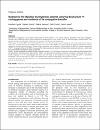Isolation of the Bacillus thuringiensis plasmid carrying Bacthuricin F4 coding genes and evidence of its conjugative transfer
| Author | Ben Fguira, Ines |
| Author | Fourati, Zaineb |
| Author | Kamoun, Fakher |
| Author | Tounsi, Slim |
| Author | Jaoua, Samir |
| Available date | 2015-12-23T08:33:55Z |
| Publication Date | 2014-06-11 |
| Publication Name | The Journal of Infection in Developing Countries |
| Citation | BEN FGUIRA, I., FOURATI, Z., KAMOUN, F., TOUNSI, S., JAOUA, S., "Isolation of the Bacillus thuringiensis plasmid carrying Bacthuricin F4 coding genes and evidence of its conjugative transfer", The Journal of Infection in Developing Countries, North America, 8(6), 2014. |
| ISSN | 1972-2680 |
| Abstract | INTRODUCTION: Conjugation is an excellent natural mode of DNA transfer in vivo between bacteria, particularly when these conjugative elements carry technological traits such as bacteriocin encoding genes. In the present work, the bacteriocinogenic plasmid pIBF4 from Bacillus thuringiensis responsible of Bacthuricin F4 synthesis was isolated and characterized. METHODOLOGY: To isolate pIBF4, the total plasmid DNA from a non-bacteriocin transposant carrying the mini-Tn10 spectinomycin selective marker was extracted and used to transform Escherichia coli strain Top10. PIBF4 was extracted from the obtained transformant and then subjected to restriction enzyme analysis. Plasmid curing experiments were conducted to test the stability of pIBF4 at a stringent temperature of 42°C. Conjugative behavior of pIBF4 was assessed by mating experiments using the non-bacteriocin transposant mutant as a donor strain and several Bacillus thuringiensis strains as recipients. RESULTS: The pIBF4 plasmid was isolated and had a molecular weight of 19.1 kb. Ninety-five percent of cells retained the pIBF4 plasmid after 200 generations, demonstrating its high stability. PIBF4 was successfully transferred to Bacillus thuringiensis HD1CryB strain with a transfer frequency of 1x10(-8) transconjugants per donor cell. The study of the recipient host range revealed that pIBF4 is specifically transferable to Bacillus thuringiensis strains with variable transfer frequencies depending on the recipient host strain. CONCLUSION: Our results show that pIBF4 is a 19.1 kb highly stable plasmid transferable by conjugation to Bacillus thuringiensis strains with deferent transfer frequencies. |
| Sponsor | Tunisian Ministry of Higher Education, Scientific Research, and Technology |
| Language | en |
| Publisher | The Journal of Infection in Developing Countries |
| Subject | Bacthuricin F4 plasmid conjugative transfer B. thuringiensis strain BUPM4 |
| Type | Article |
| Pagination | 727-732 |
| Issue Number | 6 |
| Volume Number | 8 |
| ESSN | 2036-6590 |
Files in this item
This item appears in the following Collection(s)
-
Biological & Environmental Sciences [928 items ]


